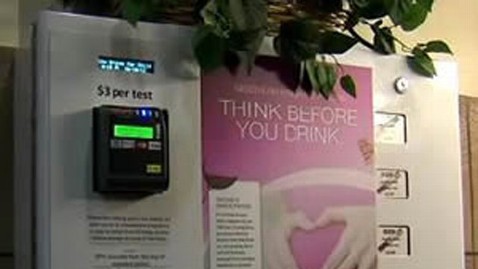Pub Sells Pregnancy Tests to Curb Birth Defects

healthybrainsforchildren.org
By Susan Kreimer
Before ordering that much-desired mojito or martini, female patrons of a Minnesota pub can check to see if they're pregnant.
Pub 500 in Mankato, a city south of Minneapolis-St. Paul, has a new test dispenser in the women's restroom. The machine charges $3 per pregnancy test on a credit or debit card.
Sparing even one unborn child from alcohol-related birth defects or developmental disabilities makes the effort worthwhile, said Tom Frederick, co-owner of the bar.
"It was another worthy cause," he said when asked about the dispenser. "We're involved in all kinds of things in our local community."
Alcohol consumption during pregnancy is a leading preventable cause of birth defects and developmental disabilities, according to the U.S. Centers for Disease Control and Prevention.
The dispenser, installed in the third week of July, is the brainchild of Healthy Brains for Children, a nonprofit organization based in St. Paul that aims to reduce the number of children with learning and behavioral difficulties linked to alcohol exposure in the womb.
All money collected by the machine goes to the organization. "I don't make a dime on the machine," Frederick said. "We just gave them wall space."
When a customer walks into the restroom, she will likely see the dispenser hanging to her right. "We've got a big mirror there - in the powder-your-nose area," he said.
The crew posted a sign on the upper left of the machine to explain its presence in a bar. "A pregnant mother should not be drinking, and there are many cases where she may not even know that she is pregnant," the sign reads, while acknowledging, "At first, we thought it was a strange idea, but quickly came to the conclusion of how this could be beneficial."
Jody Allen Crowe, the organization's executive director, was a customer at the bar. His group has plans to install a hundred of the dispensers in the Minneapolis-St. Paul area.
"But the response has been so tremendous and international," he said, that they may expand.
A new dispenser will occupy half the space of the current one, which is about 24 inches high and 26 inches wide. Crowe said he expects the new model to become available within a month.
He co-founded Healthy Brains for Children in 2008, while director of a charter school in Rochester, Minn., after working 18 years on Native American reservations in Minnesota and Idaho as a teacher, principal and superintendent. That's where he said he saw the devastation caused by prenatal exposure to alcohol.
"There was such a need" to inform the public, he said. "So I shelved my educational career" and focused on this cause.
Based on self-reports among women ages 18 to 44, the CDC found an estimated 7.6 percent of pregnant women - one in 13 - used alcohol and 1.4 percent of pregnant women engaged in binge drinking.
CDC analyzed 2006-2010 Behavioral Risk Factor Surveillance System data to approximate the prevalence of alcohol use and binge drinking among women of childbearing age. The statistics appeared July 20 in the CDC's Morbidity and Mortality Weekly Report.
An easily accessible and inexpensive pregnancy test in an establishment serving alcohol can help a woman make a healthy choice, said Dr. David Garry, who delivers babies at Montefiore Medical Center in New York and heads the Alcohol and Women Committee for the American Congress of Obstetricians and Gynecologists.
He said there should be information posted about interpreting positive or negative test results, practicing safe sex and preventing Fetal Alcoholism Spectrum Disorders, or FASDs.
"The pregnancy test alone will not necessarily alter FASDs rates," Garry said. Still, he added, "there is large potential for reduction of FASDs through the opportunity to raise awareness and provide education to women in the high-risk setting of a bar or nightclub."